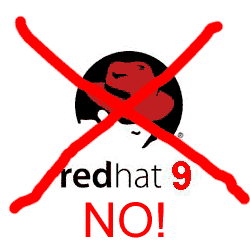I’m writing this because I found out that many Linux newbie still prefer to use Red Hat Linux 9 compared to Fedora Core distribution.
Red Hat Linux 9 has been released in 2003, and between that year and at the time of this writing, Red Hat Linux 9 has been superseded by almost 6 newer releases (Fedora Core 1 – Fedora Core 6, Fedora 7 if you want to count that too)
Red Hat Linux 9 has been long abandoned by Red Hat when it discontinued its support in April 2004 (3 years ago) in favor of Community maintained Fedora Core line (now Fedora) .
To show you that how much technology has changed since its release, Red Hat 9 includes linux kernel 2.4.20, mozilla browser 1.2.1, openoffice 1.0.2 as opposed to the latest distribution which includes linux kernel 2.6.19, (or 2.4.34, if you count the 2.4 branches) mozilla 1.8.x.
One might wonder how many security holes left unfixed when Red Hat stopped providing security patches to the operating system since April 2004 (three years ago).
What makes people (especially by newbies) still use Red Hat Linux 9 ?
- Red Hat Linux is the most popular Linux distribution during late 1990s and early 2000
- Red Hat made a terrible rebranding move, it rebrands Red Hat Linux to a completely new name Fedora Core.
- There are still lots of older “Linux for beginner” books that make reference to Red Hat Linux (7.0,7.1,7.3,8.0), this left an impression to newbies that Red Hat Linux 9 is the latest ‘Linux’ release (old book stock with free RH9 CDs is the main culprit)
- Newbies trust the content in the books 100% without taking account that computer software books has an ‘unofficial expiry date’, they should have done more research through the internet.
Implication of using Red Hat Linux 9
- People will get the wrong impression about Linux, based on outdated technology
Drivers support is not up to date with the current hardware (not much wifi support, unstable drivers)
- Old software which is buggy and crash prone
- Outdated Server softwares with tons of security vulnerabilities or even with outdated configuration file.
- Support websites which do not exists anymore, people will get lost without proper documentation
- No software updates support.
- Broken software due to changes in communication protocol (gaim msn, yahoo messenger, up2date, etc)
- Primitive software (that do not conforms with the latest trend) that may cause data loss
So please ditch the idea of using Red Hat 9 as your first distro and use latest Linux distro release for your own good, things changed a lot since RH9 been released.
Say no to Red Hat 9 :p
[tags]red hat, red hat linux,redhat,linux,debian,yum,ubuntu,kernel,distro[/tags]

